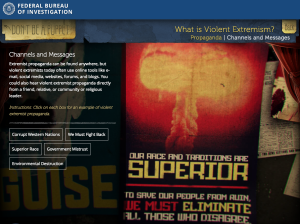From Slashdot a story about an FBI game/interactive that is online and which aims at Countering Violent Extremism | What is Violent Extremism?. The subtitle is “Don’t Be A Puppet” and the game is part of a collection of interactive materials that try to teach about extremism in general and encourage some critical distance from the extremism. The game has you as a sheep avoiding pitfalls.
Category: Computer Games
Mastaba Snoopy
From my students I heard about the game Mastaba Snoopy created in Twee and TiddlyWiki and being taught in another Humanities Computing course (our students are vectors of influence.) Here is a review where you can download the single HTML page that is the bizarre text adventure, Mastaba Snoopy is a Cronenbergian nightmare vision of childhood. The story takes place14,000 years in the future when a mutable alien has destroyed us and then reinvented itself following a collection of Peanuts comics. Play it.
Monopoly’s Inventor: The Progressive Who Didn’t Pass ‘Go’ – The New York Times

I had read somewhere that Monopoly had originally been developed to teach the evils of monopolies, but hadn’t realized how interesting the story of the creation of Monopoly was. The New York Times tells the story in, Monopoly’s Inventor: The Progressive Who Didn’t Pass ‘Go’. This excerpted from a book titled, The Monopolists: Obsession, Fury, and the Scandal Behind the World’s Favorite Board Game. The article tells the story of Elizabeth Magie who developed a game called the Landlord’s Game which had two sets of rules to teach about the alternatives to monopoly capitalism. You play the game with a rule set where the monopolists get richer and then with a rule set where wealth is distributed more fairly. Alas, when Darrow adapted the game and sold it to Parker Brothers he left out the progressive side.
It strikes me as an interesting example where a game designed for a serious purpose gets adapted to be more fun and in the process loses its progressive purpose. A change in the rules and you don’t have a game that teaches.
GamesCon 2016

After Replaying Japan 2016 a bunch of us took the train to Cologne to go to gamescon 2016, Europe’s biggest videogame convention. A selection of my GamesCon 2016 photos are on Flickr.
The convention was depressing. Long line ups for overhyped commercial titles. Music too loud. Too many hucksters getting us cheering for crap. The creative side of gaming seemed to be overwhelmed by the commercialization. A church of gaming indeed.
The best area was the retrogaming area which a great mix of systems you could play and exhibits. The indie game area also had some brilliant games including Awkward Ellie, where you play an awkward elephant at a tea party. There was also a one-d game called Line Wobbler where you controlled a dot travelling up a LED strip. Playful fun in one dimension.
Replaying Japan 2016

Last week I was at Replaying Japan 2016 which was held in Leipzig and organized by Martin Roth and Martin Picard of the jGames Research Initiative at University of Leipzig. You can see my Replaying Japan 2016 Conference Report here. The conference is the fifth such conference that I have helped organize to look at Japanese and Asian videogame culture. We had terrific keynotes from Namco game and game music designers from the 1980s including Iwatani (Pac-Man) and Junko Ozawa (music for many Namco arcade and videogames). We also had a terrific talk about the history of localization from Minako O’Hagan.
The conference continued a tradition of bringing Western and Japanese game studies researchers together in a friendly environment. The quality of papers was really quite high and the conversation even better. The time has come to develop a community of research.
Professor Emeritus Seymour Papert, pioneer of constructionist learning, dies at 88
From Humanist and then MIT News, Professor Emeritus Seymour Papert, pioneer of constructionist learning, dies at 88. Papert was Piaget’s student and thought about how computers could provide children a way to construct knowledge. Among other things he developed the Logo language that I learned at one point. He also collaborated with the LEGO folk on Mindstorms, named after his book by that title.
dhQuest: The Game
From Twitter I learned about dhQuest – a game of digital humanities. In the game I played (with just one player) I had three characters (a researcher, a librarian, and a technologist) that I deployed to complete quests as I built a digital humanities centre. Very nicely done.
Hokusai x Manga
Cover of Playboy Roasted à la Edo
The Hamburg Museum of Arts and Crafts has a well designed exhibit called Hokusai x Manga that looks at the history of comics from the first kibyōshi to current manga and videogames. The exhibit draws on an extensive collection of woodblock books and prints from the Edo period. They mix a historical approach with themes like the depiction of demons (Yokai) in print and the franchise Yo-kai Watch.
One of the earliest comic picture books that they have is Kyōden’s Playboy, Roasted à la Edo (1785). Harvard has put up a Flash version of this in English and Japanese. (Second book here, third here.) They also have a copies of Hokusai Manga (or Hokusai’s Sketches) published starting in 1814 which was a sort of manual on how to draw with lots of examples. Note that “manga” at the time didn’t mean what it means now.
There is an excellent catalogue with useful essays including one at the end on “Manga in Transition” by Jaqueline Berndt.
Shulze, S., et al. (2016). Hokusai X Manga: Japanese Pop Culture since 1680. Munich, Hirmer.
Barbie Careers Game Developer Doll: No Batteries Neede
From Slashtdot, Mattel has released a Barbie® Careers Game Developer Doll. She has “[b]right red hair and eyeglasses are fashion-forward with techie style!” This time Mattel has been careful not to be patronizing.
A laptop (with real game code graphics), tablet (with the game she is working on) and silvery headset expand the storytelling possibilities and career opportunities.
Inspire young gamers with this doll who is at the top of her game!
Dungeons & Dragons: Satanic Panic – Video – NYTimes.com
The New York Times has a video series called the Retro Report. One story is about Dungeons & Dragons: Satanic Panic. It looks at the media fed moral panic that eventually lost steam. It ends by praising all the “leadership” and “moral” skills learned. Now experts are recommending “free play” and … ironically … role playing games are now the solution!




